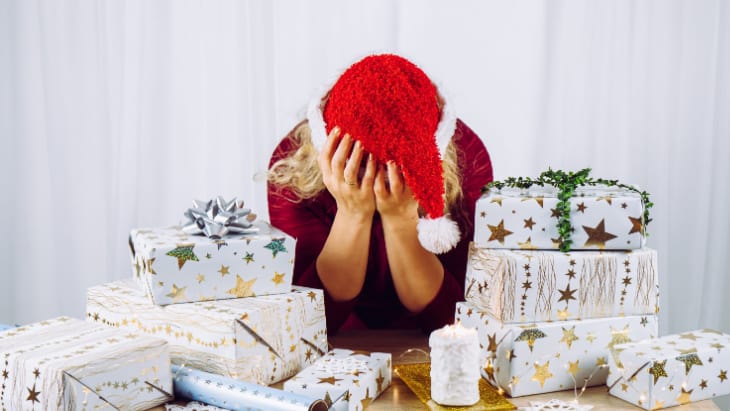Managing menopause symptoms over the festive period: If you are a woman of a certain age, then you may be you feeling increasingly overwhelmed and forgetful this month as festive responsibilities ramp up. Bupa Clinics give sage advice for managing menopause symptoms over the holiday season.
Christmas can often feel like an overwhelming time, from buying presents to hosting on the day and cooking the big Christmas roast and when you’re struggling with symptoms of menopause it can make the festive period feel even more stressful, so it’s important you’re taking steps to help manage them. Dr Samantha Wild, GP and Women’s Health Lead at Bupa Health Clinics, outlines her top tips to help with menopausal symptoms over the festive season:
Talk about how you’re feeling – a common symptom of menopause is anxiety and hosting Christmas Day can make stress and anxiety leading up to the big day worse. You may also be struggling with night sweats and insomnia which also often trigger anxiety. Let your family members know how you’re feeling and that you may need some support during the day. Talking about how you feel can help reduce the feelings of anxiety as well. They may not completely get it but they’ll have an idea of what you’re struggling with.
Know what your triggers are – while Christmas is a lovely time to unwind and spend quality time with the family, it can also be a time when you notice certain triggers set off your symptoms. Whether its family traditions that you don’t particularly enjoy or the pressure of making sure you get the dinner perfect, try and make sure you’re taking time out for yourself as well as asking for help with certain things that may be triggering anxiety or stress.
Certain foods and drinks may also bring on hot flushes or palpitations so make sure you’re careful with things that you know trigger these. I’m not saying don’t enjoy yourself but just be wary that eating lots of rich food in a short space of time may be more likely to trigger symptoms like nausea and digestive problems when you are going through the menopause. Certain foods and drinks may also bring on hot flushes or palpitations so make sure you’re careful with things that you know trigger these. A sugar crash after lots of sugary food can affect your energy, mood and concentration so try satisfying any sweet cravings with natural sugars like fruit and dried fruits. You could also swap table sugar for cinnamon to make your hot drinks more festive!
Also make sure you’re watching those unhealthy fats, like the ones found in cakes, pastries and biscuits as these may have the same effects as sugar so try to eat more healthy ones, such nuts and seeds and oily fish like salmon.
Try not to drink too much alcohol – alcohol often exacerbates symptoms, particularly hot flushes, low mood, insomnia and night sweats, so try to minimise the amount you’re drinking. While you can still have a few drinks, try to alternate between non-alcoholic alternatives or having something with lower alcohol levels in it. This will make a difference to your symptoms and you’re feeling.
Share the load – whether you have older kids or younger kids, getting them involved in helping on the day can help you from getting overwhelmed. Something as simple as getting them to peel vegetables or wrap presents for relatives can share some of jobs on the day. Similarly, if you have family or friends over, why not suggest you do the cooking all together so it doesn’t fall on your shoulders and stress you out. When you’re dealing with symptoms such as brain fog, it can be easy to forget things or where you were up to with things, so having help on the day can make a huge difference.
Create a plan to help you manage symptoms – a good place to start is sticking to a similar routine, the festive period can often feel like a blur so trying to keep up as much of your usual routine can help you manage symptoms, particularly those of anxiety. Keep to set times to go to bed and get up each day and make sure you’re exercising regularly as part of this. Make sure you’re also making time for yourself to relax and unwind, whether this is being creative, going for a walk or simply watching a box set or reading a good book it can help boost endorphins, reducing stress.
Cooking the Christmas dinner can make many of us feel a bit hot and sweaty but when you’re struggling to manage hot flushes it can be even harder. Make sure the kitchen is well ventilated and that you’re not wearing too many layers. Keep a jug of iced water on hand at all time, top it up and keep drinking. You could also try keeping a spritzer of water in the fridge and use it when you’re feeling too hot. Alternatively stand outside, alone, in the cold air for a few minutes and breath slowly, this will help ease tension and make you feel calmer and more relaxed.
Seek support – it’s really important that if you’re going through menopause and struggling with your symptoms that you seek support. There can be easy ways to help manage them, from lifestyle changes to taking HRT, and a doctor will be able to advise on the best course of action. At Bupa Health Clinics we offer our Menopause Plan to people giving them 45-minutes with a trained GP to discuss their symptoms and choose the best treatment plan. We know many women find it difficult to open up about what they’re experiencing and seek support but we’re here to help when you need it.
- The Truth About Tanning and Staying Safe in the Sun - 21st April 2025
- Inspired into Action: Summer Sport Surge - 2nd August 2024
- 2024 Health Trends: What to Try and What to Avoid - 30th January 2024


